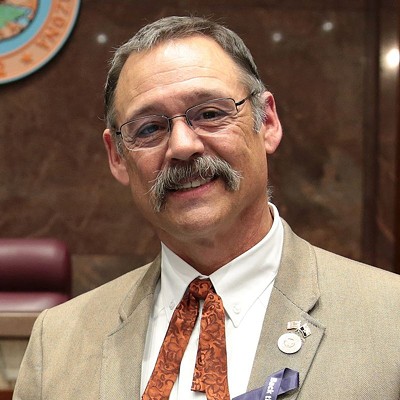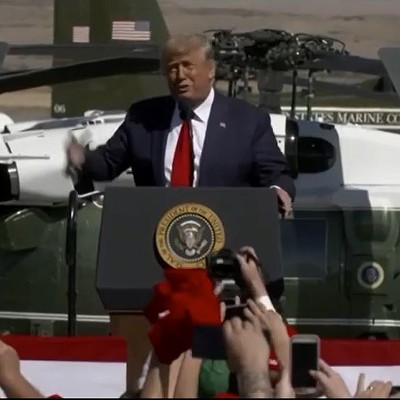When City Manager James Keene delivered his billion-dollar budget last week, he presented a list of tax and fee increases that have been rejected in various forms by City Council members repeatedly in recent years: a garbage collection fee, taxes on residential rental payments and advertising revenues, a hike in the property tax, higher park and rec fees, impact fees for new development and various other nips and tucks that would total roughly $55.9 million this year.
Call it the Groundhog Day budget: Keene continues to pitch the tax and fee increases in the hope that this time, the reaction of council members will be different.
In his intro letter, Keene says that the city's strategy of balancing the budget by dipping into reserve funds and putting off maintenance of roads, buildings and other infrastructure is taking a toll on the community.
"Everything is far from fine," says Keene. "The way we have gone about balancing budgets has resulted in a long-term pattern of avoiding the structural deficit in the city's budget. ... (I)t has led to decaying infrastructure and a decline in the quality of city services that influence our quality of life."
In an attempt to build political momentum for his proposals, Keene last May created the Citizen Finance and Service Review Committee, which spent almost a year working with city staff to look over Tucson's books. In February, the committee released a report estimating that the city had roughly $3.9 billion in unmet needs. (See "Financial Firestorm," page 21.)
The citizen committee, which backed many of the proposals in Keene's budget, painted a dire picture of Tucson's future.
"Without immediate action, followed by fundamental change, we see Tucson heading toward a future as a second-rate city at best and almost certain financial collapse at worst," reads the committee's report. "The threats to our community are every bit as real as the firestorm that swept through Summerhaven in 2003."
But a majority of the council members--Republican Kathleen Dunbar and Democrats Steve Leal, Shirley Scott and José Ibarra--remain unconvinced that the council needs to raise taxes. Although their reasons differ, the four say they oppose most of Keene's big-ticket items, including the garbage fee, the rental tax and the advertising tax, which together would raise an estimated $29.7 million in new revenue for the city.
Councilwoman Carol West, a Democrat who represents the eastside, supports the garbage fee but is skeptical about the other two proposals.
Mayor Bob Walkup says he's reserving judgment on the proposals while his staff reviews the budget to look for other cost savings through staff cuts. But overall, he says Keene's budget has the right priorities. "I think he did exactly what we asked him to do."
Fred Ronstadt, a Republican who represents midtown Ward 6, didn't return phone calls from the Weekly.
Unless Keene, who also failed to return a call from the Weekly, can swing at least one of the council members who oppose his plan, he will have to find a new way to crunch the numbers and handle the city's spiraling costs.
While the entire proposed budget is $1.018 billion--a $60.1 million increase over last year--the figure is a bit deceptive, because it includes restricted federal and state funds, as well as self-supporting utilities like Tucson Water.
The proposed general fund budget--the area where city staff and elected officials can play with the numbers--would climb from $352.6 million to $397.2 million, an increase of $44.6 million. (Next year, it would climb another $17 million to $414.2 million, although the city's overall budget would decrease to $931.1 million as one-time bond projects are completed.)
One significant area of increased funding is public safety. Keene recommends spending some $13.2 million on more cops and firefighters, as well better benefits to keep the current ones on the job. Two additional fire stations would cost an additional $2.8 million.
The Tucson Police Department, which actually cut positions last year to help the city bridge a $46 million deficit, could use a boost in its struggle with the community's rampant crime. Last month, the community's high number of thefts put Tucson at the top of the list of worst large cities for crime, based on FBI figures compiled by Sperling's BestPlaces.
"Tucson has one of the highest property crime rates in the country, especially larceny," noted the report.
TPD is so short-staffed that last year, police worked only 695 burglary cases, leaving 6,513 burglaries unassigned to detectives, according to police department stats. The cops investigated 716 fraud cases, leaving 3,469 potentially solvable frauds without investigation.
"Those are the property crimes," says TPD Assistant Chief John Leavitt. "There are cases in other crime arenas where we don't give full attention to cases we wish we could. We certainly don't assign all the aggravated assaults we'd like to assign. While all homicide cases are assigned, we don't give all homicide cases the attention they deserve because of the lack of staffing."
In addition, a lack of civilian workers has backed up TPD's labs.
"If you get burglarized today, and our burglary detective has fingerprints that the police officer lifted from the scene, those fingerprints typically won't be compared for two years," says Leavitt. DNA tests can take even longer--up to 2 1/2 years.
Earlier this year, Police Chief Richard Miranda told the council that his department had roughly 938 gun-carrying officers on the street--an average of 1.8 cops per 1,000 citizens. The mean among communities surveyed by the city was 2.3 per 1,000.
Keene's budget would hire 71 officers next year, with another 23 the following year, at a cost of $7.5 million during the two years. In addition, it would add civilian workers in the police lab.
Miranda estimates that getting the community to 2.4 officers per 1,000 residents would require increasing the force to 1,272 cops. The price tag, including civilian support staff, a new substation and improvements to the crime lab: more than $56 million.
"The truth is, that's going to be a very difficult goal to obtain," says Leavitt. "But we have to try. And if we don't start that this year, it's even more difficult the year after that."
Think that's bad? Check out the city's transportation bills. The cost for fully revamping major arterials is roughly $300 million, with another $300 million for residential streets, according to Transportation Department Director Jim Glock. Add in the cost of widening streets to handle growing congestion, and the estimate jumps to $2 billion. Toss on top another billion dollars for street lights, sidewalks, drainage, parking garages and public transit, according to the city's most recent five-year capital improvement budget. That alone accounts for more than three-fourths of the city staff's $3.9 billion wish list of unmet needs.
To make a dent, Keene proposes spending $20 million next year and an additional $10 million the following year to resurface 292 lane miles, or between 15 to 20 percent of the city's streets. If the city can maintain that funding trend and spend $150 million during the next decade, Keene estimates most of the city's major streets can be repaved.
So why does the capital budget estimate that the city needs $300 million to repair major streets? Glock says that Keene's estimate includes only repaving costs and doesn't account for rebuilding streets that are pretty much shot.
"It'll stop the decline that the streets are in, as opposed to actually bringing the streets up to a new condition," Glock says.
Other city departments have also been appearing before the council this year to ask for more money. Parks and Rec Department officials said they need about $361 million for more parks, playgrounds, ramadas and ball fields, while library staffers asked for $103 million to build and stock new facilities.
Then there's the city's solid-waste department, recently renamed Environmental Services. In addition to its annual bills for collecting garbage and recyclables, the department needs about $29 million in the next five years to expand the Los Reales landfill and properly cap and clean old landfills, according the Environmental Service's Karen Masbruch. The long-term costs climb as high as $57.5 million.
Environmental Services plays a major role in Keene's budget. He proposes to make the department a utility, or an enterprise fund, just like Tucson Water. City residents would pay $14 a month--or $168 a year--for garbage and recycling collection. The fees would raise an estimated $19 million a year that would be freed up from the city's general fund.
The debate over garbage fees has become a perennial event, with Keene proposing them and council members shooting him down. He did make some headway last year, when council members agreed to enact a $2 monthly charge for brush-and-bulky collection that residents get twice a year. (That fee would be included in the $14 monthly bill.)
Keene argues that almost all other Western cities outside of Denver and San Diego charge some kind of fee for refuse collection.
"We are long overdue in making this change and directly charging all consumers for the true costs of garbage pick-up and disposal," he says.
He's got one solid yes vote on the council.
"I've always supported a garbage fee," says West. "If we don't do that, I don't know what we will do."
But West is skeptical that her colleagues will support the proposal, for good reason. Garbage fees remain the third rail of city politics, with at least four council members--Scott, Leal, Ibarra and Dunbar--opposing them.
"I said I opposed them when I ran for office," says Dunbar. "When does your word mean something?"
Most of Keene's other tax proposals have equally weak support. The rental tax, which would tack an additional 2 percent on to rents above $600 a month, would raise an estimated $6.2 million. Keene says most large Arizona communities, with the exception of Tucson and Flagstaff, charge the tax.
Opponents of the tax say it would hurt renters, who are often less financially stable than homeowners.
"I think it's regressive, and I can't support that," Scott says. "I think it's on the backs of the very people who are trying to get upwardly mobile, and this puts another barrier in their way."
West agrees. "I really hate reinstating the rental tax, for obvious reasons," although she would consider it if there was a break for low-income renters.
The rental tax spurred a major protest at this week's City Council meeting, with hundreds of renters turning up to protest the idea. They were organized by the Arizona Multihousing Association, which sent out fliers to apartments across Tucson, gathered 5,000 petition signatures against the tax and brought busloads of angry citizens to pack a ballroom at the Tucson Convention Center. City officials were so overwhelmed by the turnout that they scrambled to add to the 750 chairs they'd originally set out for the budget meeting, according to one city staffer.
Nancy Nicolosi, president of Schomac Property Management, argues the rental tax amounts to double taxation, because apartments already pay property taxes. "It's unfair," she says.
The advertising tax, which would add 2 percent to advertising revenues collected by local media outlets (including the Weekly) and other advertising operations, would raise an estimated $3.6 million. Keene says the advertising tax, just like the rental tax, is commonplace in other Arizona cities; it was even collected in Tucson until 1992, when the council voted to eliminate it.
Critics of the tax, including Dunbar, say local businesses such as restaurants would pay more to advertise, while national chains would escape the bite, because their marketing is covered by corporate headquarters.
Keene has trimmed another $9.7 million by cutting all city support to the library system, with the expectation that Pima County would pick up the bill. But his approach seems more theatrical than practical.
Although Keene's broached the subject with council members, he's yet to initiate a conversation with county officials about the shift in funding. Unless the Board of Supervisors is willing to accept the proposal--and double the library district's property-tax collections--then cutting the funding will merely devastate local libraries.
Two supervisors, Republican Ann Day of District 1 and Democrat Sharon Bronson of District 3, say they're willing to discuss changes with city officials, but they don't foresee the county taking over the system before the council adopts this year's budget.
Bronson would consider creating an entirely separate regional library district outside the control of the city and county, once other local jurisdictions have a chance to discuss the details.
"The idea of a regional library system is a good one, but it needs to be worked out a policy level before it gets talked about at a budget level," says Bronson.
Day says she's puzzled by Keene's approach to the issue. "I just don't understand James Keene," she says.
County Administrator Chuck Huckelberry says that the library system was historically funded by the city of Tucson. The county created a library district about two decades ago in an effort to boost the system's resources, but it never anticipated taking over complete responsibility.
With the roughly $12 million that the library tax raises, the county currently provides about half the funding for the city's libraries and all of the funding for libraries in unincorporated Pima County.
Huckelberry says Keene's plan seems to be a tax shift for Pima County residents, since the county would have to raise property taxes to cover the new costs.
"On the one hand, I think we have certain members of the City Council complaining the high county tax rate," Huckelberry says. "On the other hand, we basically have the same ones saying we ought to double or triple the library district tax rate. It would be interesting if we were to receive a letter from every member of the city council and the mayor actually recommending the board double the tax rate. Then, we know who's causing the tax rate to be increased."
Councilwoman Shirley Scott says Keene's approach isn't likely to accomplish much.
"It's rather impertinent to make a decision and hand it off to the county without a good, healthy discussion, which I think would be a more appropriate way to go about this," Scott says.
Unless Keene can round up support for the above proposals, he's short at least $39.4 million of the $55.9 million he hopes to juggle to balance the budget.
Leal, Ibarra and Scott say that the city's improving fiscal outlook--Keene estimates the city will pull in $14.8 million through increased sales taxes and additional state funds--will cover the costs of the public safety component, and other bills will either have to wait or be paid in a different manner.
Ibarra says he wants to see more "creative" budget moves, although he doesn't suggest what those might be. Scott believes that savings could be found by allowing rank-and-file workers to suggest ways to save money. Dunbar remains convinced that the city is still not as efficient as it could be. And Leal says the city needs to work harder at recovering money in areas like commercial trash pick-up.
Keene may have enough support to finally impose development impact fees, but the modest $1.3 million they're expected to raise won't go far. Other than that, Keene hopes to increase property taxes by $3.8 million and borrow $10 million to cover half of this year's paving costs--which would be repaid out of the general fund in the future, according to Transportation Director Jim Glock.
West says time is running out for the City Council to attend to the structural deficit in the city's budget.
"It's now or never," she says. "We're at that point, and I don't think some people realize how grave our situation is. We're going to keep struggling along like this and we're going to get farther and farther behind. The streets get worse; the parks get worse; and pretty soon, people are saying, 'My God, this is a Third World country.'"
Walkup acknowledges that there are major roadblocks to the changes that Keene has requested.
"Nobody ever said it was going to be easy," Walkup says.















